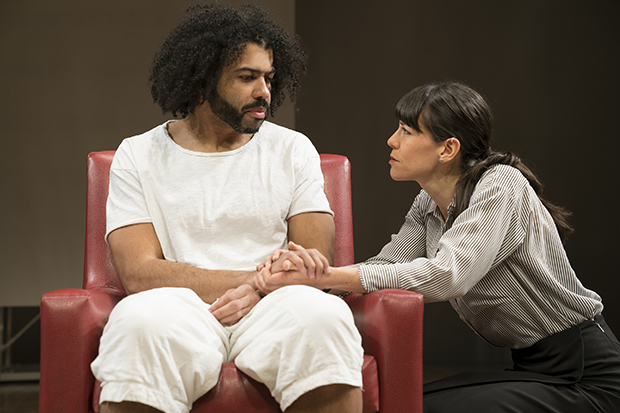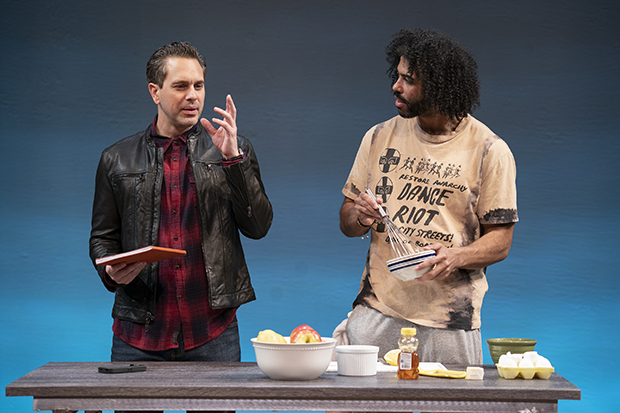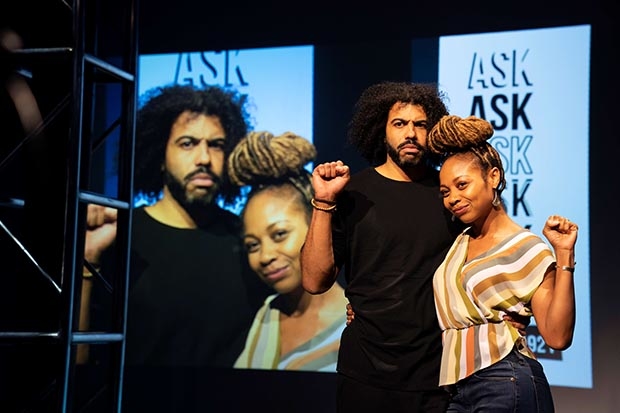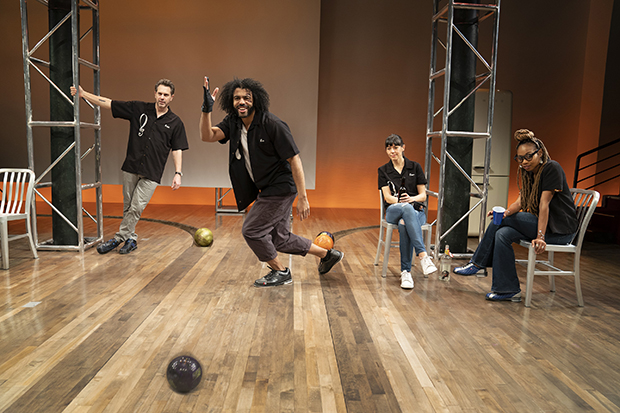For Suzan-Lori Parks, White Noise Underscores Black Anxiety

(© Joan Marcus)
"The Contract is broken, people," argues a desperate attorney to we the people of the audience, "that Social Contract that nobody seems to remember having signed. Which is why common courtesy seems more and more like a f*cking miracle. Which is why everything that feels so sure, can so easily fall apart." It's a declaration that jumps out, grabs your collar, and forces you to pay attention — one of about a hundred such moments in White Noise, Suzan-Lori Parks's heavy, messy, fascinating play, now making its world premiere at the Public Theater under the direction of artistic director Oskar Eustis.
White Noise is the first new play from Parks since 2014's Father Comes Home From the Wars (Parts 1, 2 & 3). In that epic Civil War drama, a soon-to-be-freed slave named Hero speculates on his future: "'I belong to the Colonel,' I says now. That's how come they don't beat me. But when Freedom comes and they stop me and ask and I say 'I'm my own. I'm on my own and I own my ownself,' you think they'll leave me be?" This acknowledgement that we live in a society that values white property over black lives seems to be the starting point for White Noise.

(© Joan Marcus)
Leo (Daveed Diggs) is a black visual artist living with his white girlfriend, Dawn (Zoë Winters). They have been double-dating with Ralph (Thomas Sadoski) and Misha (Sheria Irving) since college. A longtime insomniac, Leo wanders the streets late at night to clear his head. But when one of those walks ends with the cops slamming his head against the pavement, Leo is left feeling more vulnerable than ever. Dawn, who is a lawyer, wants to sue. But Leo has an alternative plan: He will sell himself to Ralph, a rich white man who has inherited a nationwide chain of bowling alleys. Leo figures Ralph can offer him the safety as a slave he is sorely lacking as a free black man. He even has an attorney at Dawn's firm draw up a contract for the purchase, which she reluctantly notarizes once Ralph agrees to sign.
The second act goes on to imagine Leo's life as a slave, but it would be more believable if it depicted Dawn's disbarment proceedings for certifying a flagrant violation of the 13th Amendment. Such contracts (while popular in the BDSM community) are completely inadmissible in court, and we imagine that any cops would scoff when presented with a man's certificate of ownership. That the entire play doesn't fall apart under the weight of this ludicrous premise is a testament to the heft of Parks's language and the unflappable ability of this cast to sell it.

(© Joan Marcus)
Diggs leads the way with an emotionally exposed performance. We feel his exhaustion and understand his desire to find a safe harbor, even if it's one from which he cannot depart. Winters brings palpable sincerity to Dawn, the aggressive ally. Sadoski gives emotional roundness to Ralph, a character that travels the flat terrain between whiny trust-funder and unapologetic sadist. Irving is a master of code-switch as Misha, a woman whose lesbian college-professor moms are mystified by her livestream show, "Ask a Black." Dialing up her Ebonics for the camera, Misha answers her callers' questions about blackness, leading to some of the funniest moments in the play. Each of the actors gets an extended monologue (called a "solo" in the program), and they use it to capture our imaginations with Parks's trenchant observations.
Unfortunately, those observations feel divorced from real dramatic stakes. One of the callers to "Ask a Black" seethes to special guest Leo, "You're just some college educated kid who's playing a game that completely dishonors the actual Experience." It's hard not to see his point: Realistically, Leo's behavior looks like little more than a glorified performance art project.
Of course, Parks may be writing from the because-I-said-so school of magical realism, which has scant regard for the petty boundaries of plausibility. But there is little indication of that alternate universe from Oskar Eustis's straightforward production, which places realistic performances in a pared-down but still recognizable setting.

(© Joan Marcus)
Clint Ramos's versatile set allows for the creation of a variety of spare urban interiors, provided we accept that each of them has bowling gutters running through them (naturally, the bowling alley scenes work best). Projection designer Lucy Mackinnon fully visualizes "Ask a Black" with live video displayed on screens around that set. Toni-Leslie James costumes the actors in contemporary clothes, from Leo's artist active wear to Ralph's born-again prepster getup. We could see any of these outfits in the lobby of the Public, rendering the world of the play too close to our own to accept the fantastic leaps Parks makes in her story.
But it is still possible to find truth in her words. Parks has a lot to say about the corrosive nature of slavery, the sexual allure of the taboo, and the limitations of consent (which is not the silver bullet of sex and freedom it is purported to be). While the sexual plot twists sometimes make White Noise feel like a highbrow soap opera, it also feels like a microcosm of American society: Resentment simmers among Leo, Dawn, Ralph, and Misha from the outset, but they stick together as friends and lovers nonetheless. White Noise asks what it takes to transform their passive-aggression into plain old aggression, and how long they can live with that aggression before their bonds of friendship break and everything falls apart.










